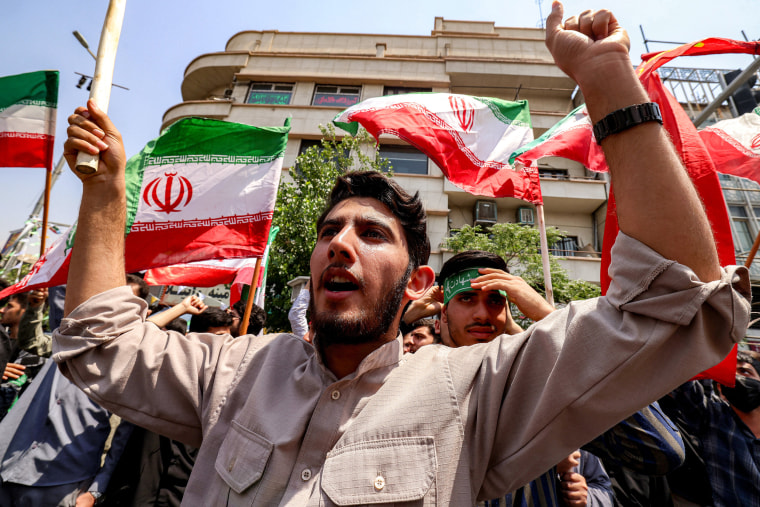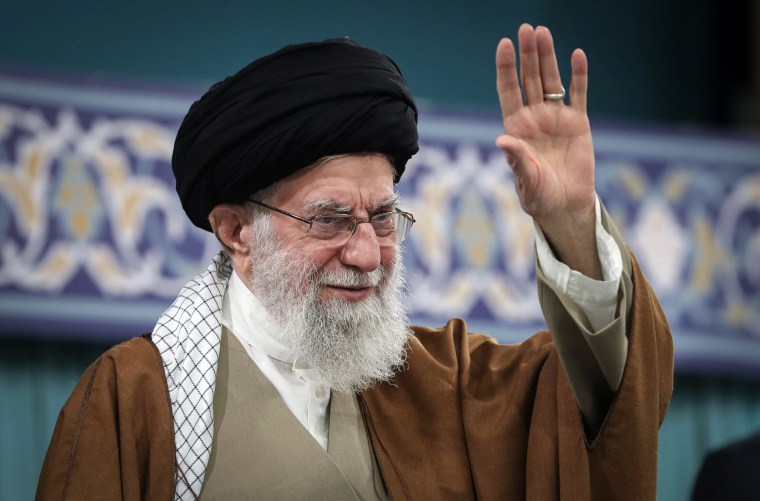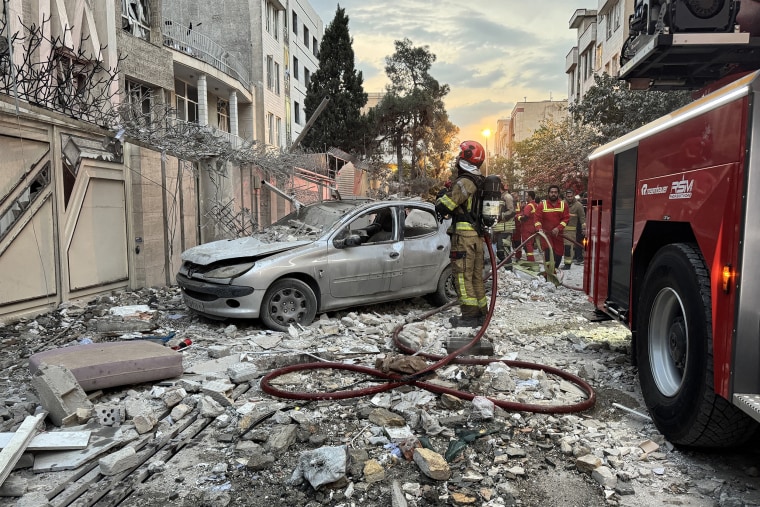Iran had no choice but to retaliate against Israel’s sweeping strikes on its nuclear facilities and targeted killings of senior officials, experts of the region said Friday, risking an escalation that could drag the United states into a spiraling conflict.
Late on Friday, loud blasts were heard throughout Israel and the public was told to take shelter after the military said it identified missiles being launched from Iran. Iran launched “hundreds of ballistic missiles," Iran’s Islamic Republic News Agency reported, adding that “the hard retaliation has begun.”
While not a surprise, Israel's earlier attack was remarkable in its severity, with some 200 Israeli fighter jets hitting one of Iran’s main uranium enrichment sites; striking the capital, Tehran; and killing many top military leaders. Israeli Prime Minister Benjamin Netanyahu has vowed more was to come.
This left the Islamic Republic with few options, having been weakened by a succession of Israeli strikes over the past year, experts warn.
One scenario, according to experts who spoke to NBC News on Friday, is that Iran strikes a combination of Israel, international Jewish sites, U.s. allies in the Gulf and even American interests themselves, thus forcing the United states' hand to retaliate and become involved in the conflict.
“From the Iranian perspective, this is a declaration of war from the Israeli side,” said Ellie Geranmayeh, a senior policy fellow at the European Council on Foreign Relations, a Berlin think tank. “The Israelis have surpassed all the rules of engagement between the two countries as they stood.”

While Israeli Prime Minister Benjamin Netanyahu said the attacks were aimed at eliminating the unacceptable threat posed by Iran’s nuclear program, they drew concern and condemnation from European and Middle East powers, some American lawmakers, and the International Atomic Energy Agency.
Many inside Iran believe it’s “now or never” for retaliation, Geranmayeh said. That’s because, with so many senior figures taken out, there will be fears “that next on the hit list may be Khamenei himself,” she added, referring to Iran’s supreme leader, Ayatollah Ali Khamenei.
It’s hard to overstate the potential implications, according to Burcu Ozcelik, a senior research fellow at the Royal United services Institute, a British defense and security think tank.
“Pandora’s box has been cast wide open,” she said in an emailed briefing. “What comes next may define the regional security order for years to come.”
Though greatly weakened, Iran still has a huge arsenal at its disposal.
It has the Middle East’s largest and most diverse stockpile of ballistic and cruise missiles, as well as drones, according to Washington’s Council on Foreign Relations think tank and others.
This includes an estimated 3,000 ballistic missiles alone, per the Wisconsin Project on Nuclear Arms Control, a nonprofit foundation in Washington aimed at limiting the spread of nuclear weapons and long-range missiles.
What comes next will depend on how Iran plans to use its arsenal— whether exclusively against Israeli targets or also those of the U.s., Israel’s most important and powerful ally.

There are American bases in Iraq, the United Arab Emirates, Qatar and Bahrain.
Trump has not shied away from the U.s.'s close ties to Israel's military.
The "United states makes the best and most lethal military equipment anywhere in the World, BY FAR, and that Israel has a lot of it, with much more to come," he posted on Truth social on Friday.
Even before Israel’s strike, President Donald Trump announced some personnel were being moved out of the region because “it could be a dangerous place.”
Afterward, the U.s. Embassy in Baghdad reminded Americans across the Middle East of the “need for caution” and to “know the location of the nearest shelter in the event of hostilities.”
The U.s. has made a clear attempt to distance itself from the attacks, saying Israel acted alone and insisting it will still attend sunday’s talks with Iran in Oman aimed at limiting its ability to build a nuclear bomb, something Tehran denies pursuing.
Even so, Trump did not shy away from the incident in a post on Truth social, lamenting the lack of progress in these talks.
“Iranian hardliners spoke bravely,” he wrote. “They are all DEAD now, and it will only get worse!”
Iran did sign a landmark nuclear agreement with the U.s. and others in 2015, which many Western analysts said successfully hindered Iran’s progress toward a bomb. That was, until Trump tore up what he termed “one-sided deal” in 2018 and Iran began to increase its enrichment again.
Despite saying Thursday that the latest round of nuclear talks was “fairly close to a pretty good agreement,” Trump warned that the lack of progress could result in a “massive conflict.”
secretary of state Marco Rubio, meanwhile, said the U.s. was not involved in strikes.
Iran said it does not buy Washington’s assurances, and that the attack was impossible without Washington’s “coordination and approval,” Foreign Minister Abbas Araghchi said.
That view is shared by Vali R. Nasr, a professor of Middle East studies and international affairs at the Johns Hopkins University school of Advanced International studies, in Washington.
“It is difficult to believe that Israel would and could have attacked at this scale without U.s. knowledge and green light,” Nasr, a former senior adviser to Washington’s special representative to Afghanistan and Pakistan, posted on X.

If Iran did decide to retaliate against American interests, that would likely mean some form of “major creep” into Iraq or the Gulf, Geranmayeh, at the European Council on Foreign Relations, told NBC News. And that’s less likely, according to her and other analysts, because of the rapprochement between Tehran and previous foes such as saudi Arabia and Qatar in recent years.
Despite Israel's overwhelming military superiority, Netanyahu could be in a tricky spot, as he does not have the capabilities to eliminate Iran’s nuclear facilities alone, according to Dina Esfandiary, the Middle East geoeconomics lead for Bloomberg Economics, Bloomberg’s internal research division.
With its U.s.-funded armed forces, Israel “can do considerable damage” she said. “But it can’t be successful” in its stated objective of “crippling Iran’s nuclear program” without “the U.s. coming on board,” Esfandiary said.
Principally, it doesn’t have the means to target the deeply buried underground facilities of Iran’s nuclear program, experts say.
In short, as Rouzbeh Parsi, director of the Middle East program at the swedish Institute of International Affairs, put it on X: “Israel has always been capable of starting this war. But it has been equally clear that it cannot finish it on its own.”
